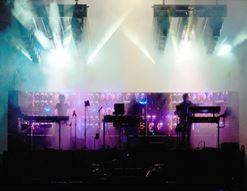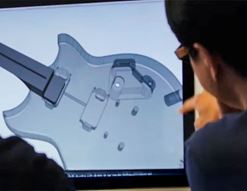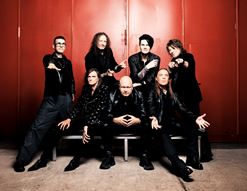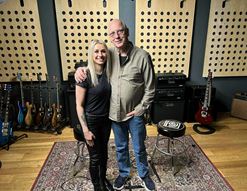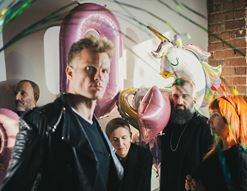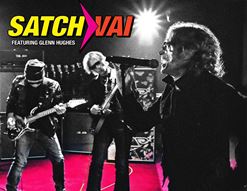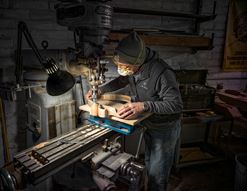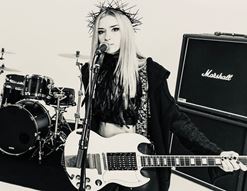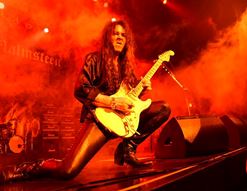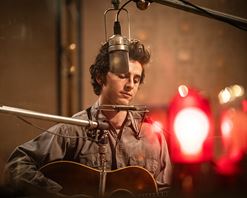“I made a bass last week! Here, I’ll show you...”.
Devin moves away from his studio desk to retrieve a freshly created P-bass, with a carbon-fibre pickguard and EMG pickups. It’s lovely, and he’s showing it to me in an attempt to convince me that he does in fact have some relaxing down time in his life.
This is in response to me listing his activities thus far in 2020, which is an intimidating list by anybody’s standards: live albums, ambient albums, 5.1 remixes, streaming gigs (you’ll get a full list further down)...and on his days off he goes off and makes basses.
Down time? I’m not buying it.
To say that Devin Townsend ‘gets shit done’ is probably one of my more obvious understatements. Most artists have been felled at the knees by covid, but Devin has taken this horrible state of affairs (he has lost as much as other artists) and turned his unstoppable momentum to task after task. Earlier in the year, he created a series fundraising streaming shows for struggling health services (including our own beloved NHS, which is doubly awesome considering the UK is a foreign country to him), and a whole host of other projects. It’s an inspiring, if exhausting, thing to comprehend his 2020 activity, and he’s not done yet...
This month sees the release of Order of Magnitude, a superb double-disc live document of last year’s ambitious Empath album. Bringing a superbly talented group of musicians together, Devin and his band endeavoured to replicate the entire Empath record, along with a handful of other songs, all without backing tracks or loops to rely on. Everything would be played live, and all detours, jams and mad moments would be kept in the show. Empath is maybe one of his most challenging records to play, but the gloves were off, and the result is pretty staggering. If you were there at one of the shows, you’ll already know that. If you weren’t, you’ll wish you were!
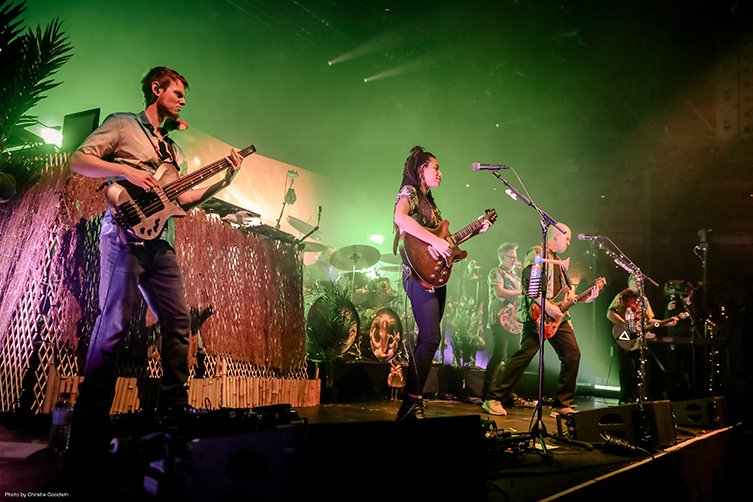
We were particularly lucky, then, to be able to chat with Devin very recently from his studio in Canada, via the newly indispensable wonders of Zoom (who even knew about Zoom before lockdown?), to discuss as many of his vast cadre of projects as time would permit!
Read on to hear about what he’s currently working on, how he doesn’t think of himself as much of a riff guy (?) and, significantly, some VERY worthwhile studio tips on mixing, EQ’ing and panning your own recordings. The man’s a renaissance master, so it’s worth paying full attention!
Fans of Devin will already know that he doesn’t often take himself very seriously, and our conversation was, as always, full of laughter. Even when he threatened to get serious about a subject, he invariably made a joke about it all as well, and I hope that comes through clearly in the transcribed conversation below. He’s a very entertaining guy to speak to, so please enjoy...
Devin Townsend Interview
Devin Townsend: Ray!
guitarguitar: Dev!
DT: How’s it going buddy?
GG: Not bad, how are you?
DT: Yeah man! Best as I can be, I think!
GG: So, you’ve had a ridiculously busy year, so we’ll see how much we get through! I mean, this is just September, and you’ve already done: the Order of Magnitude live album, the covid solo shows, the By-Request shows – of which there’s another one coming up – the ambient improvisation albums, the YouTube Podcasts, the (Devin begins laughing) Empath Ultimate Edition and now you’re also doing the Nail the Mix production masterclass! Now, I know you like to stay busy, but how are you coping with that workload?
DT: Well, it’s funny: when you say it like that, it sounds absurd, actually! Plus, there was a bunch of other things in there that we even overlooked! When you say it like that, it sounds crazy. People have asked me in interviews recently how I’ve been getting all this work done and what have you, and I can’t actually figure out what other people were doing with there time! (laughs)
I mean, I wake up, have a bit of a morning routine and I have some breakfast, answer my emails, get to work, take a lunch break, wait till the kid gets home from school, y’know, hang out with him, exercise at five, have dinner, get to work till about ten thirty...I just do that every day! I also read a book, go for a walk, y’know, sometimes I’ll watch some TV or whatever. So, in the other time that I have, what else would I do? I can’t think of it! Other than scrolling through Twitter, I don’t know what human beings are supposed to do! (laughs) So I just do this, and over time, a lotta things get done!
GG: Yeah, totally! That’s a very straightforward way to attack it. Monday to Friday, exercise at five...
DT: That’s what it is, and I think that discipline has always kind of worked well for me: imposing some sort of order on to my life. Even if I wanted to do something else, even if I got sick of work – and I’m very fortunate that I like my job so much, right? – but even if I did get sick of it, I mean, what would I do? I’d make walking sticks or...take up pottery! I made a bass last week! I put a bass together, sanded it down and put a bunch of Danish oil on it, put it together, so that’s kind of a hobby, I guess?
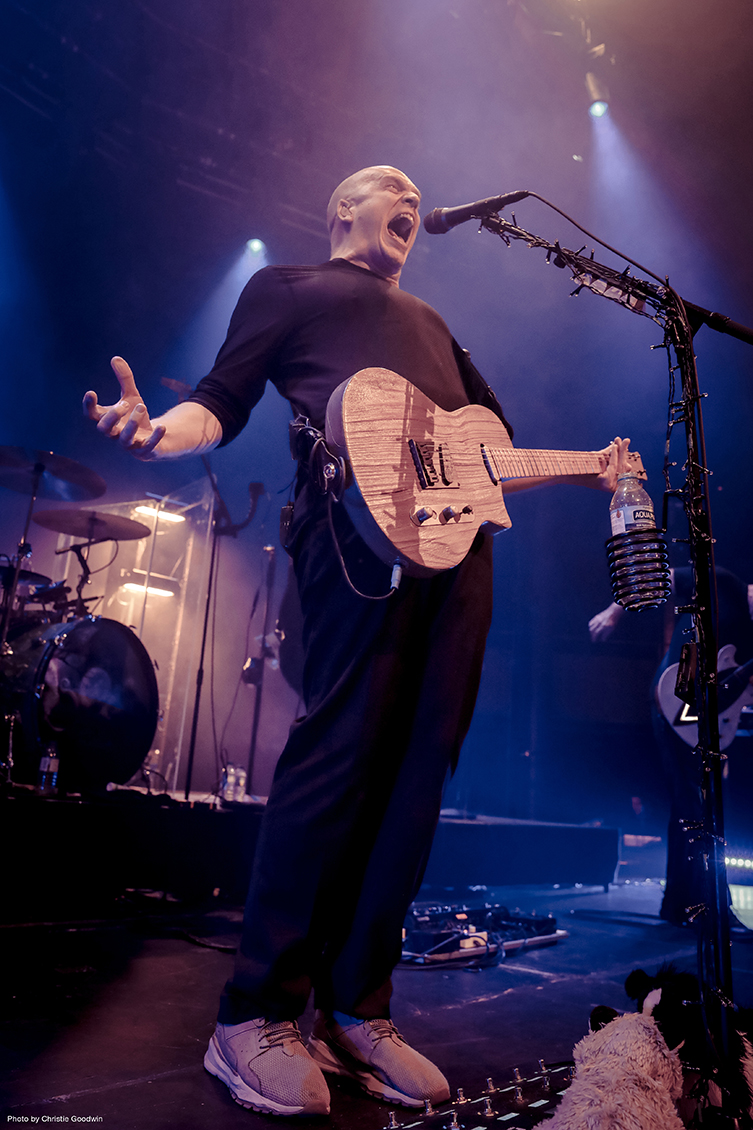
GG: Wow! Is that the first time you’ve tried that?
DT: No, I’ve done it a bunch of times, I enjoy it! Here, I’ll show ya, gimme a second. (Devin disappears from view and comes back with a gorgeous looking Natural P-Bass with black hardware) It was just some old shitty bass, and I had a neck made. It was a hideous green colour, so I just kinda sanded it off and did six coats of oil, made this carbon fibre pickguard...it’s actually alright, man!
GG: It’s badass! That’s a good sanding job!
DT: It’s not bad! It’s not bad. Again, my point was, I just don’t understand why (starts laughing again) ...when people tell me what I do, I feel sort of embarrassed, but I don’t think I’m super-obsessed with it, maybe it’s just my time management is good! I’m not sure.
GG: Well, if I think all of the covid interviews I’ve done since the UK lockdown in March, some people are doing writing sessions with people, and some people are putting their feet up and watching Netflix! I reckon maybe you’ve just got a good work ethic, man.
"There seems to be a reoccuring theme: I wanna make alien pop music!"
DT: Well, I mean, I was certainly not raised with a significant amount of...we’re a pretty working class family, and oftentimes I find that when I see people who are doing nothing, or who are just panicking, I’m just like (laughs) I dunno how that’s gonna serve you, man! If you can’t figure out a way to get shit done, it’s like...
It’s interesting how this time has kind of made that a feature in this whole industry that we’ve got. You’ve got to be self-motivated at this point because no one else has got the patience or the energy to do it for you, right?
GG: Totally, totally. Now more than ever. And not only that: funding as well. So much of the gig revenue and everything is gone, so it’s like: what can you do on your own? And that’s why someone like yourself, who can write, produce and do everything, is in quite a good position.
DT: Well yeah, and also what’s been interesting about it is the amount of things I’ve had to learn. Since the lockdown, I’ve had to learn Premiere Pro, Photoshop, OBS, Twitch, how to do video, how to set up for simultaneous...you know, all the things that have happened that have been admittedly frustrating, because there’s so many aspects of these learning curves that are new to me.
GG: Uh-huh.
DT: By the end, I’m shocked! I’m like: I know how to do this; I know how to do that. It makes me a one-man wrecking crew!
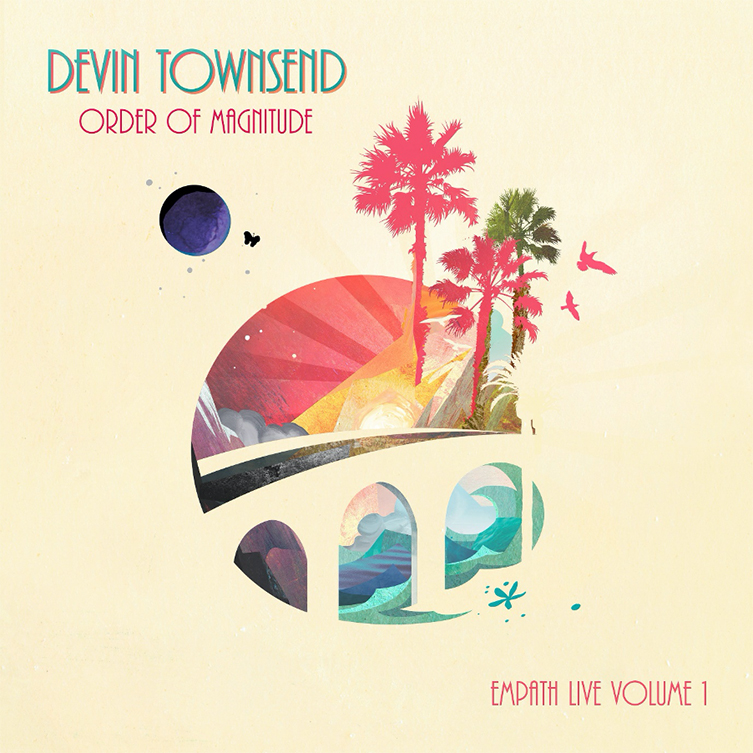
GG: Haha! More so than you were before! So, the release of your live album Order of Magnitude is pretty soon. I’ve had a listen and it’s absolutely incredible.
DT: Thank you.
GG: Last year, when we spoke in Edinburgh, you mentioned this upcoming tour for Empath, where you were gonna have live musicians instead of backing tracks, all of that stuff. It was one of those ‘I don’t know what’s gonna happen’ situations, so how do you feel about it all now that you are on the other side of it? Being that it was spectacularly successful?
DT: Well everything’s a step to the next thing, right? And so, I tend to spend all my energy while I’m making something trying to make it as good as possible. Admittedly, when it’s done, I kinda flush it. (I start laughing) Haha, like: gone, right? So, the Order of Magnitude thing is like, five or six projects ago, so when I think back to it, I struggle to remember.
I don’t think there’s any objectives, it’s not like any of these projects I take on are consciously with an eye on the future. Like, ‘well, if I do this, it will allow me to experience this, confront this fear’, whatever. I don’t think it’s that. I don’t think I’m that clever, to be honest. I tend to just focus on it because it’s like, everything on my professional and personal world sort of drives me towards that as a compulsion.
GG: Sure.
DT: And then once it’s done, I realise that maybe there was something in there that I felt I had to learn, maybe? Like, how to be without that net, how to work without the computers live, how that made me feel, the pros of it, the cons of it. Everything I do is a reaction to what came before, so what I’m working on now probably has a lot to do with that experience, now that I’m thinking about it.
GG: Yeah, that was another thing that you brought up last time we spoke: at that point, Empath had been out or a month or so, but you already had two or three different concepts and collection of material forming. They were all kind of wrestling to get to the pole position and become your next project. Does that stuff relate to what you’re working on now?
DT: Yeah! I really like the process of trying to uncover the next step. Or, trying to figure out what the puzzle is, or trying to let the image come into view: I really like that process! I find it irritating that it takes as long as it does because everything is a slow motion movement for me, and because a part of me is really impatient and excited about it, like, ‘it’s gonna be this light-work thing, or it’s gonna be this night-work thing’ and so I just keep writing and writing and writing and writing. That’s what I’ve been doing, amidst all the work, I’ve written about 25 songs. It’s kinda what I do for fun: writing is what I do for fun because all the rest of it is work in a lot of ways.
GG: Mmm.
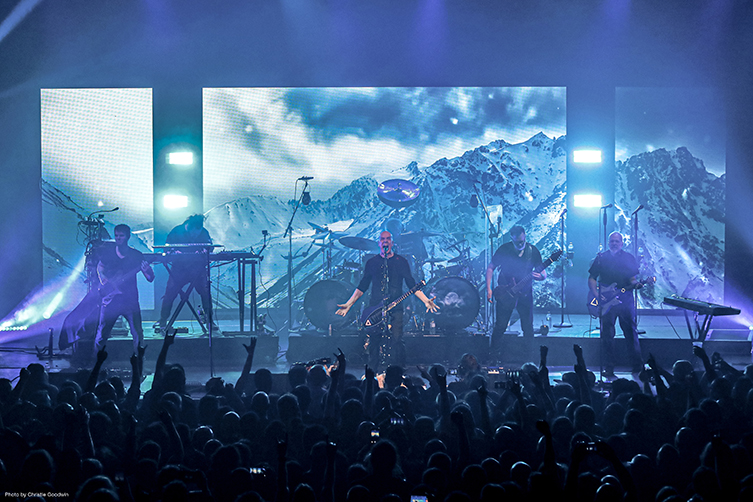
DT: So, I might get a couple of nights a week where I’m like, ‘Okay: turn the phone off, wife and kid are ok, I’m just gonna go bananas for a couple of hours and see what happens. And out of that, there’s been about 25 strange ideas, and it’s all over the place! It’s like it was on Empath: I have some orchestral stuff, some heavy stuff, some mellow stuff, some poppy stuff, some commercial stuff, some abstract stuff. But, also like Empath, there’s no real definitive identity that seems to be appearing. So, I started working with a producer, and I’ll fill you in more on that later, but now every week I’ll go visit this guy with my demos. We’ve been good friends for many years so he’s conscious of the fact that I’m like, you know, pretty stand off-ish when it comes to these sorts of things (laughs) but he’s really been cool because he’s been like ‘do your thing and bring it, and I’ll give you my opinion’, and I can go back, you know what I mean?
GG: Yeah.
"Everything I do is a reaction to what came before"
DT: I went there the other day and he said, ‘Well, what is this period of music about?’. I said, ‘At first, it’s like this covid thing, it’s sort of neurotic, meandering, aimless, complicated bunch of shit’. And I don’t love what I’ve written, and it’s not that it’s not accurate, it’s almost too accurate! (laughs) It’s like, I don’t wanna hear about what’s been going on! This is one of the least inspiring times ever! So, throughout those songs, though, there seems to be this reoccurring theme that I’m starting to realise now. It’s only been in the past week that I’ve started realising it, and its...like, I wanna make...alien pop music! (laughs) Like, if you were listening to a Top 40 station on some crazy alien planet, light years away.
GG: Haha, okay!
DT: I want it to be easy to sing along to, I want it to be structurally really tight; I don’t want it to be, you know, ‘Ah, there’s a butterfly!’ and it goes off for four minutes into a bunch of weird riffs, right? I want it to be really tight arrangements and really good songs, and I want it to be fucked up!
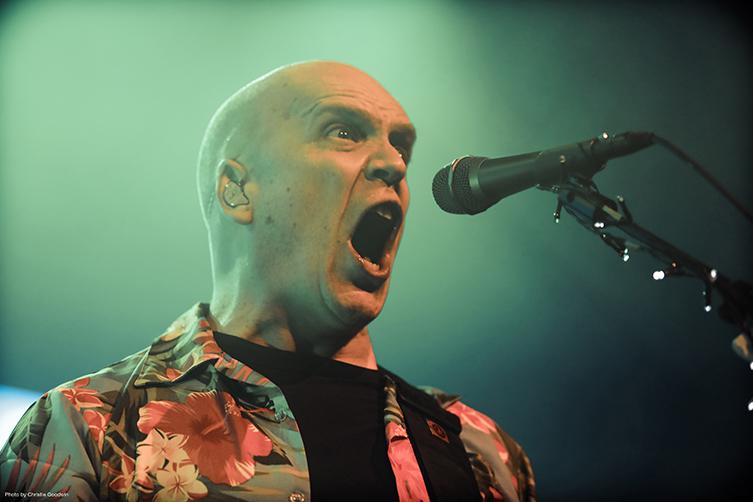
GG: Hahaha!
DT: So, I can’t figure out...it seems to not be heavy. It’s like Steely Dan or something, I don’t know, and so I keep...no, not Steely Dan, but every time I add something heavy to it, I’m like, ‘Ahhh, nah’. So, I’m sort of following that right now. I think that there’s a certain aspect with the producer and label and everything that are like, ‘Well, if you could make it a little heavier, that would probably be great’, so I’m trying to incorporate a bit of that, but I dunno! It’s this weird, alien pop music. That’s the only thing I can think of. Or alien rock music.
GG: No, that’s awesome!
DT: It’s really weird! (laughs) It’s really weird.
GG: Well, if we think about the idea that you have this strange music, and then you think, ‘maybe I should add a riff’, and then you end up not liking the riff, does that mean that your riffier tunes, like for example, like Mountain, or Depth Charge, for of those kinds of songs, does the song come after the riff? Do you land on a riff and then figure out a verse to go around it?
DT: Sometimes, but I mean, typically, the way I write is different all the time. There’s no real rhyme or reason to it. I’m not riff-oriented. Maybe that’s also something, as I’m throwing all this into the soup pot here that I should give more thought to, but I’ve never really been a riff-oriented guy. I mean, I listen to Megadeth or whatever and it’s, you know (mimes lots of fast notes), Lamb of God, all this stuff, it’s like: riffs!
GG: Uh-huh.
"Turn the phone off - wife and kid are ok - I'm just gonna go bananas for a couple of hours and see what happens"
DT: For me, the guitar has always just been a kind of foundation for a bunch of other shit. Every now and then I’ll play guitar and happen upon something that’s riffy and work on that. Other times I’ll start with some weird loop and then start to find, in the loop, where the melodic information that I find appealing is, and then accentuate that with keyboards. I can start building patterns and rhythm underneath it, and that all becomes sections and I sort of smooth it out and then you have a song.
Other times, it’ll just be an acoustic guitar and I’ll just play standard tuning (Devin is known for primarily using Open C tuning – Ray) and it’ll be C, G and D. So, there’s no real rhyme or reason, and it tends to involve what I did prior, because then I typically won’t do that again for a little while.
GG: Okay, well, we’re gonna have to disagree on the fact that you’re not a riff guy because that’s the maddest thing ever. (Devin laughs) You’re one of the best riff writers out!
DT: Do you think? Oh, man!
GG: Dude, don’t get me started. That’s a ridiculous thing to say! Haha!
DT: Well, I appreciate it man! I mean, I think there’s some riffs in there, but when I think about what a guitar’s function is, in the stuff I do, it’s always been very similar to what my vocals are, in that it’s a component of the song, as opposed to anything that leads it.
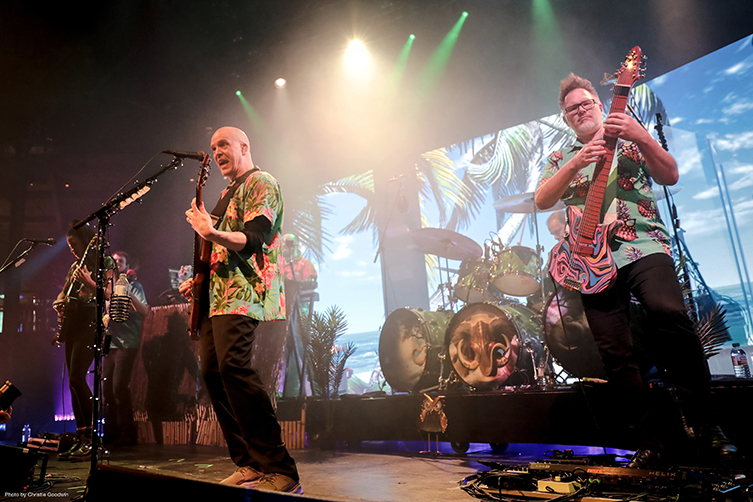
GG: Okay.
DT: A lot of times, people in my professional word that have opinions on what I do are always like, ‘You should turn your vocals up!’. ‘Ahh, that’s where they should be!’ And they say, ‘yeah, but it’s sort of buried in the mix’ and I go, ‘I know, right?’ (laughs)
GG: In a lot of your songs, you seen to just casually throw amazing riffs around. You know, some tunes will have about nine riffs in it, and at least four of them are, like, stonkers, that only last a few bars and then don’t come back! It’s great riff after great riff and it’s almost like this never-ending stream of brilliant riffs. You must be easy about throwing them away because you know there’s gonna be another one coming along in a second?
DT: Thanks, man. Funny, this producer that I’ve been seeing said the exact same thing. He’s like, ‘I’d really like to see you hang on some of those for a while and make them into songs!’ And my whole thought is not, like, ‘Hey man, it’s my work, I’m not gonna do that!’, it’s more, ‘Okay, we could try that!’ Because, as important as my work is for me – which it is, you know, massively – I’m not so precious about it that, if I’m with people whom I have a lot of respect for, it’s like cast in stone.
"I'll start with some weird loop, and then start to find, in the loop, where the melodic information that I find appealing is, and then accentuate that"
GG: Uh-huh.
DT: I sent him a song the other day that was twelve minutes long, about forty riffs, all sorts of bleeps and bloops, choirs, orchestras, all this shit, and he was just like, ‘That section there is awesome! And then you lose me here, and then this section here is awesome’. So, in light of trying to make this alien pop music, I’m like, ‘Okay, let’s try it. I can use that part somewhere else. Let’s just take those two things and put it together’. And it’s really cool, because all of a sudden, it’s like, wow, there’s no fat on that! It’s interesting. But I also feel that some stages of my career, the meandering has been really important, like on Terria or Empath or several others. There are these songs that are going, and all of a sudden, they hit a speed bump that goes this way for five minutes, and I like that!
GG: Yeah!
DT: I think that was, at the time, exactly what I wanted to explore. Now, when I do that, I find myself a little irritated by it, like, ‘Come dude, just reel it in’.
GG: Haha! Fair enough. Well, talking about guitars in general and their function, obviously you’re very good at knocking out the big riffs, as we now both agree on, so thank for going with me on that one (laughter from Devin), but another element that I really love is what I’d call your ambient guitar playing. I know that’s not much of a descriptive term, but it’s the cleaner stuff with the delays and reverbs, like on the ambient improvisations you released.
DT: Yeah.
GG: So, what I was wanting to ask you a little bit more about was some of the techniques and effects use. How do you build those beautiful sounds up?
DT: I think a lot of the ways - going back to how some of these songs are written – I think a lot of them start with ambience, for me. I love loops, I love hypnotic things, like years ago on Ocean Machine, I wrote Voices in the Fan. That was based on this experience that I and other people have had, where you hear a loop just over and over, there starts to appear in that loop... things. I guess human beings are pretty pattern-seeking, so in that ambience, you start to hear what may start as a (makes small atonal melodic noise), all of a sudden you hear like (makes a more melodic variation on previous noise) and there’ll be something up in the higher register. The more I listen, there’ll be something that sounds like a cello, and something that sounds like a violin, and another that sounds like a vocal line. So, I often write riffs by making ambience and then just picking out of that ambience, some sort of melody.
With the guitar sound that I typically use for making those sounds, it’s usually two delays and a reverb, basically. It’s a super-long analog delay that has very little attack, even ducking it, if possible, like a de-esser on it.
GG: Yeah.
DT: And a bit of a ‘warble’ on it, but it’s all about the mix. I try to find the point between... in a note, the first repeat is too loud, like louder than my first note, versus, I hit it and the one that I hit is just slightly below, so it’s like 50%, I guess. And then, from there I’ll go into a ten second reverb or something, forty second reverb, I dunno. And then I’ll take a lot of the low end off of it, so the goop doesn’t just end up going forever. Then on top of that, I’ll put on a ping pong delay that has a lot of repeats and very little high end, right?
GG: Yeah.
DT: Then I either do an auto-swell, like if I can have a preset that has an auto-swell, or I’ll use a volume, but what I prefer to do is find a balance with the delays that I can just use my fingers, and I don’t hear the guitar. I don’t hear the attack; I just hear the cloud. That tends to be how I do it, and sometimes what I’ll do is, I will arm a track in Pro Tools with a tempo, set my delays to that tempo and then just jam with it. Then I’ve got a whole bunch of jamming that I can then take a chunk from, and that becomes a section that’s in time with the drums, right?
GG: Ah, and then just drop it in! Anything you do is gonna work, then!
DT: Yeah.
GG: Cool, that’s a great idea!
DT: Yeah, it’s really cool.
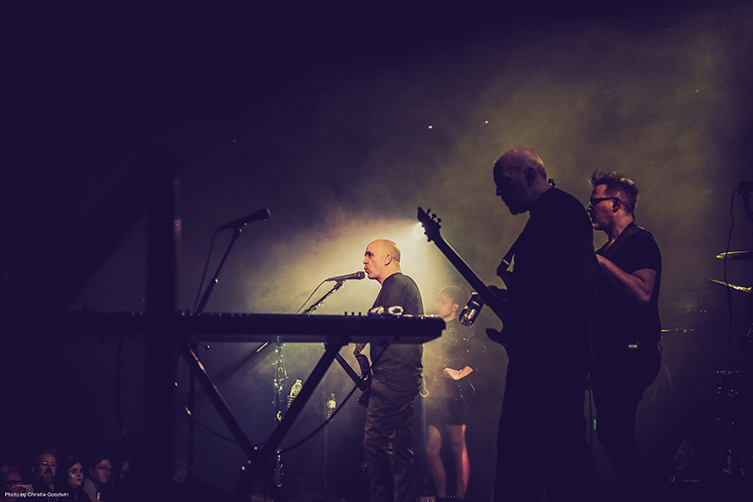
GG: Now, we don’t have too long left, so I’ll try and cram in a few more questions! For one thing, just while we’re on the subject of guitar sounds... your Nail the Mix course is obviously about attacking a big, full, complex mix, but for our guitarguitar audience, could you share a tip or two about how you maybe pan and EQ your big fantastic Uber-Crunch guitar tones please?
DT: Yeah, well there’s a bunch of things at play here, and I’ve been doing it for so long that I have a lot more insight on it than I did in the beginning. So the mixes are becoming clearer. One of the biggest problems is frequencies being overpopulated. The frequency range that tends to be the most problematic in my work is usually the upper mids, somewhere between 500 and 3.5k. The reason is: the distortion on the electric guitar, the cymbals, the timbre of French Horns, trumpets, orchestra stuff, the frequency of my voice – and when I overdub my voice, it stacks up – so all that information ends up being right there.
"The guitar, in the stuff I do, is a component of the song, as opposed to something that leads it"
Whenever in the past, when I’ve given my work to a mixer who’s convinced that, you know, the reason why I’m having troubles with it is because I don’t know what I’m doing versus his vast experience (laughs), ‘See, this is how you do it!’ I get the mix back and all he did was he turned down all the things that were in that frequency range! Like, ‘Yeah, it’s easy!’ Wanna made it sound good? Sure! Turn down the orchestra, turn down the choir, turn down the cymbals, you know what I mean? (laughs) There ya go! Well done! All right, can I have my files back? Fuckin’ donut! So, it’s like, what I find is that you have to be very discerning as to what plays where, and then you have to find where it’s mid frequency sits compared to everything else that’s going on at the time.
What I’ll do is, if there is a section with a lot of choirs and a bunch of heavy guitars and a bunch of orchestras, I usually start with the guitars along with the drums and try and make them sound reasonably like a heavy guitar. When I bring in the vocals, I will dip in the vocals where the push on the low end of the guitar is, and then I’ll dip in the guitar where the push in the vocals are.
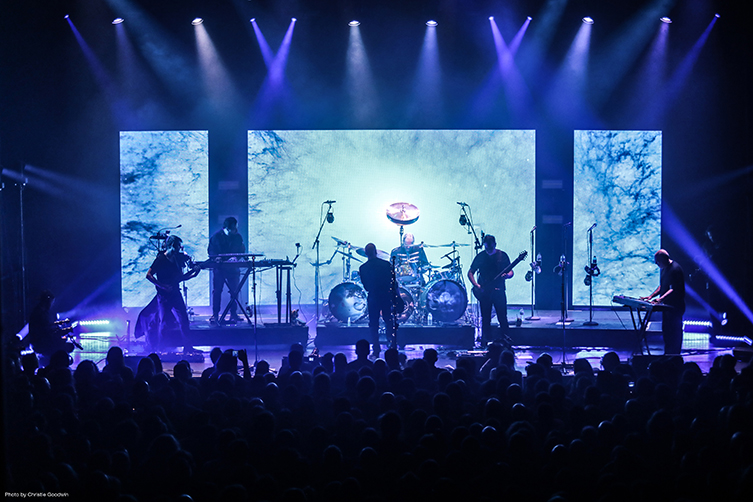
GG: Ahhh!
DT: So, you’re making these little craters for it, right?
GG: Yeah, yeah, yeah!
DT: And once that’s in, I’m like, ‘Hey, this sounds okay!’ and I have to bring in the next thing, like the orchestra. Now, all of a sudden, it’s a mess again. So I have to say, ‘Okay: how much of the orchestra has to go in that same frequency range as the choir, which is also working the same frequency as the guitar! What I’ll do is, I’ll compress the shit out of the orchestra and take a bunch of the low end out, and then it sits right in the mix, like really up front.
But then, there’s not enough energy in that high mid, or there’s too much energy in that high mid, so I’ll try to carve some out of that in the guitar, and by that point, you’ve got too much out of the guitar and you can’t hear the guitar any more. So, it’s this weird thing, and what I’ve done in the past, typically, my solution was to get rid of all the cymbals (laughs). There’s no cymbals in this song, you know what I mean? But, as I get older, I think, ‘Yeah, but cymbals are a really important part of the drums, right?’ So I’m trying, but then you incorporate the cymbals, you gotta cut vocals, heavy guitar, orchestra, choir and cymbals! So, you’ve got these little dips, and what I end up doing is, I’ll do a lot of multi-band compression, where, if there is a certain note, for example in the horns, that gets in the way of shit...if you look at the spectrum analyser of Fab Filters stuff, or Waves stuff, whenever that note hits, if it’s real time, you’ll see the EQ spectrum. It’s like each note exists at a frequency. So, what I’ll do is, if there’s something that’s sticking out, but I like it for the rest of the part, I’ll clamp down with a multiband compressor on that note.
GG: Got you!
DT: So, every time the horns hit a ‘D’, if it’s too much – but sounds good for the rest of the song – I just drop a multiband compressor really tight on that frequency. Every time the note hits, it just ducks it slightly, man.
GG: It drops out a wee bit. Wicked. That’s a wicked tip.

DT: Yeah, and then panning as well. So, if you’ve got a ton of things going and you’ve only got two speakers – I mean, I mixed in surround and that spoiled me for life – but if you’ve only got the two speakers, what I tend to do is offset panning. Like it you had the vocals here (gestures towards middle of mix) and then one guitar here, and like a flute here, and the oboe over there (gestures to different parts of the perceived left-right panning spectrum, all spaced out) you know what I mean? You’re carving out a little more space, so when you hear it, it’s not like this mono effect. And I do a lot of it on headphones.
GG: So, say if you were doubling your guitar part, you wouldn’t necessarily have them 50% left and 50% right? Could it very much depend on context?
DT: Guitar I tend to do ‘hard pan’. But if it’s a feature, like if it’s a melody, I might do it a little differently. I might offset it. Another way to get room is... say you’ve got a guitar melody with a reverb on it. What I might do is, I might put the guitar 100% to the left but put the reverb there (motions closer to centre) It creates the illusion of more space, I find.
GG: That’s amazing! And when you mean hard left and right, you’re talking about 100% left and right, yeah?
DT: Yeah.
GG: That’s why your stuff sounds so massive.
DT: Well, you gotta keep going! The more space I can get in the middle, man! If I can put all that shit to the right and left, that’s even better, haha!
GG: Big time! Well, to kind of round things off, you’ve got your Halloween ‘By Request’ convert coming up. This time, these are all going to be songs that you’ve never really played live much at all, right? That’s awesome, but do you like making life extra-difficult for yourself? Haha!
DT: I’d like to think not, but I think it could be viewed as that! I prefer to view it as: I’m very thankful to have the job that I do, and if you’re gonna ask people to keep watching your silly streams, you can’t just play Kingdom 700 times! You’ve gotta try and do something that’s gonna give people a reason to come and check it out. I do appreciate massively the audience. Massively! So, when I’m doing these things, it’s not based on me trying to, I dunno, be seen or something, it’s just that I appreciate people letting me do this! This is great! So what do you want? And a lot of times, people want these things and so my job is to make it happen!
GG: Awesome! Well, I think that’s a perfect note to go out on here, Devin. Thank you so much for your time, it’s been great!
DT: You’re so welcome, brother!
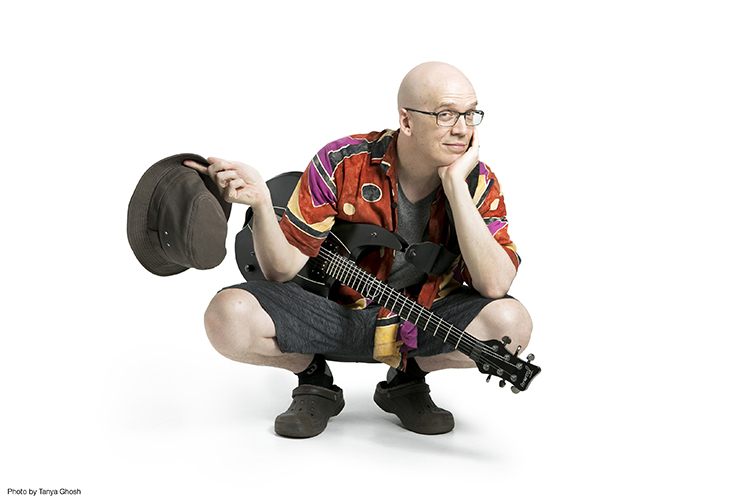
Truly, there’s no one like Devin. Even in our thirty-something minutes of talking, he managed to share so many great nuggets of info, perspective and loads of valuable production tips. We do hope that he has some holiday time factored into his calendar soon though! No one deserves it more.
Alien pop music. I can’t wait! Until then, keep up with Devin, and find tickets for his Halloween By Request streaming show, at the official Devin Townsend website.
We’d like to thank Devin, for fitting us into his schedule and giving us such a generous conversation. We’d also like to thank Simon Glacken for all of his help setting us up, and to Tanya Ghosh and Christie Goodwin for the superb photos.
Thanks to you, as always, for being here and reading this! We’ll see you next time.

